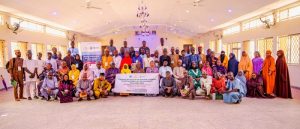The International Climate Change Development Initiative (ICCDI), in collaboration with various esteemed organisations such as Hope for Rural Girl’s Initiative, Manashfa Integrated Services, Jewel Foundation, and ALGON in Gombe State, recently organised a one-day local government net-zero workshop and the North Central Regional Summit on Accelerating Nigeria’s Emission Reduction Commitment for Local Government Authorities.

The event is considered pivotal in shaping the climate action narrative in Nigeria, particularly within the context of the north-central region, which includes Gombe and its neighbouring states.
The workshop commenced with a compelling address from Mr. Olumide Idowu, Executive Director of ICCDI Africa, who emphasised the importance of collective action, stating, “Climate change knows no borders; it affects us all. We must work together to create effective strategies to reduce emissions and protect our planet and local government for future generations.”
The overarching goal of the workshop was to cultivate a dedicated approach towards achieving net-zero emissions across local government areas in the region. With climate change being one of the most urgent and pressing challenges of our time, the workshop served as a critical platform for various stakeholders, including local government officials, civil society organisations, and community representatives, to come together and strategise on actionable steps that can be taken at the local level.
The engagement fostered by this event is said to be integral to not only meeting Nigeria’s national commitments but also addressing global climate goals.
The workshop’s agenda was rich and varied, focusing on several critical areas for fostering a sustainable future. Participants engaged in rigorous discussions about sustainable practices that can be implemented at the local government level. These discussions aimed to identify practical solutions that can be adopted to mitigate the adverse effects of climate change.
Renewable energy adoption was a significant theme, emphasising the transition from fossil fuels to cleaner energy sources to reduce greenhouse gas emissions. Local governments were encouraged to explore solar, wind, and other renewable energy technologies that could be integrated into their energy policies.
Eunice Bosede Adebayo, a Hope for Rural Girls Initiative representative, highlighted the workshop’s impact, stating, “This platform has provided us with the knowledge and tools necessary to implement real change in our communities. We must take these lessons back home and act on them.”
In addition to renewable energy, the workshop addressed crucial aspects of waste management, highlighting how proper waste disposal and recycling can significantly reduce emissions. Attendees were educated on various waste management strategies that promote environmental sustainability and enhance public health and community well-being.
The discussions also provided insights into developing climate-resilient policies that can withstand the challenges posed by climate change. By focusing on local needs and conditions, these policies are crucial for ensuring that communities can adapt and thrive in the face of environmental changes.
A significant highlight of the event was a field visit to the Malam Sidi area in the Kwami Local Government Area of Gombe State. This visit was not just a part of the event, but a crucial step in gathering firsthand insights and data from key local government officials and community stakeholders.
Through comprehensive consultations and interviews, the delegation aimed to understand the unique challenges and opportunities that exist within the local context. This direct engagement with the community was vital for informing the development of a robust net-zero climate action plan tailored specifically for Kwami Local Government.
The insights gained from the field visit will play a crucial role in shaping the action plan, ensuring it is grounded in the realities faced by the community. The plan addresses specific climate-related challenges by incorporating local knowledge and experiences while leveraging local resources and capacities. This collaborative approach enhances the relevance of the action plan and fosters a sense of ownership among community members, which is essential for the successful implementation of climate initiatives.
The workshop and subsequent field visit mark a significant step towards a more sustainable future for Gombe State and the broader north-central region of Nigeria. By bringing together various stakeholders and facilitating meaningful discussions, the initiative aims to empower local governments to take decisive action in their emission reduction efforts. Through this collaborative framework, it is hoped that Gombe State and other states in the region will emerge as leaders in climate action, setting a precedent for other regions to follow.
In conclusion, the International Climate Change Development Initiative and its partners have taken a commendable step in addressing climate change at the local government level. The commitment to achieving net-zero emissions is not just a goal but a necessity for ensuring a sustainable future for future generations.
Gombe State and other north-central states can pave the way for a more resilient and environmentally conscious society through continued collaboration, knowledge sharing, and community engagement. The success of these initiatives will ultimately depend on the collective efforts of all stakeholders involved, underscoring the importance of unity in the fight against climate change.
By Shittu Ismaila, Director, M&E, ICCDI Africa
